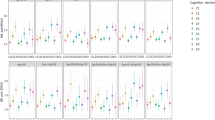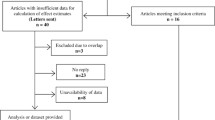Abstract
Background and aims: The relationships between blood pressure (BP) and cognition are complex and are still partly unclear. The impact of history of hypertension, present BP levels, and left ventricular hypertrophy (LVH) on cognition was investigated in a 10-year follow-up study of an aged population. Methods: The population-based sample consisted of 75-, 80- and 85-year-old individuals at baseline (N=650). Their history of hypertension was investigated, and present BP values were recorded several times. Echocardiographic examinations were performed twice at 3-year intervals, and elec-trocardiography (ECG) at entry. Cognitive function was assessed by the Mini-Mental State Examination (MMSE) at baseline and at 10 years, and by the Clinical Dementia Rating (CDR) at baseline, at 1, 5 and 10 years. Results: At baseline, elderly individuals with impaired cognition or dementia had lower BP, but thicker left ventricle posterior wall (LVPW), greater cardiac mass, and more often signs of LVH in ECG than those without cognitive deficits. Echocardiographic LVH, but not BP, predicted cognitive decline in a 5-year follow-up. Patients who died demented within 5 years were characterized by low BP and thin LVPW. Baseline BP and echocardio-graphic variables were not significantly different between those who had and had not cognitive decline at 10 years, but declining BP tended to precede cognitive deficits. Conclusions: Results indicate that, the closer cognitive decline, the lower the BP, and suggest that, although LVH is a risk factor of cognitive decline, it loses its predictive value in old age.
Similar content being viewed by others
References
Wilkie FL, Eisdorfer C. Intelligence and blood pressure in the aged. Science 1971; 172: 959–62.
Battersby C, Hartley K, Fletcher AE, et al. Cognitive function in hypertension: A community based study. J Hum Hypertens 1993; 17: 117–23.
Elias MF, Wolf PA, D’Agostino RB, Cobb J, White LR. Untreated blood pressure level is inversely related to cognitive functioning: The Framingham Study. Am J Epidemiol 1993; 138: 353–64.
Starr MJ, Whalley LJ, Inch S, Shering PA. Blood pressure and cognitive function in healthy old people. J Am Geriatr Soc 1993; 41: 753–6.
Launer LJ, Masaki K, Petrovitch H, Foley D, Havlik RJ. The association between midlife blood pressure levels and late-life cognitive function: The Honolulu-Asia Aging Study. JAMA 1995; 274: 1846–51.
Skoog I, Lernfelt B, Landahl S, et al. 15-year longitudinal study of blood pressure and dementia. Lancet 1996; 347: 1141–5.
Elias PK, Elias MF, D’Agostino RB, et al. NIDDM and blood pressure as risk factors for poor cognitive performance. The Fram-ingham Study. Diabetes Care 1997; 20: 1388–95.
Kilander L, Nyman H, Boberg M, Hansson L, Lithell H. Hypertension is related to cognitive impairment: a 20-year follow-up of 99 men. Hypertension 1998; 31: 780–6.
Swan GE, DeCarli C, Miller BL, et al. Association of midlife blood pressure to late-life cognitive decline and brain morphology. Neurology 1998; 51: 986–93.
Tzourio C, Dufouil C, Ducimetiere P, Alperovitch A. Cognitive decline in individuals with high blood pressure: a longitudinal study in the elderly. EVA Study Group, Epidemiology of Vascular Aging. Neurology 1999; 53: 1948–52.
Kivipelto M, Helkala E-L, Laakso MP, et al. Midlife vascular risk factors and Alzheimer’s disease in later life: longitudinal, population based study. BMJ 2001; 322: 1447–51.
Knopman D, Boland LL, Mosley T, et al. Cardiovascular risk factors and cognitive decline in middle-aged adults. Neurology 2001; 56: 42–8.
Farmer ME, Kittner SJ, Abbott RD, Wolz MM, Wolf PA, White LR. Longitudinally measured blood pressure, antihypertensive medication use, and cognitive performance: the Framingham Study. J Clin Epidemiol 1990; 43: 475–80.
Scherr PA, Hebert LE, Smith LA, Evans DA. Relation of blood pressure to cognitive function in the elderly. Am J Epidemiol 1991;134: 1303–15.
Desmond DW, Tatemichi TK, Paik M, Stern Y. Risk factors for cerebrovascular disease as correlates of cognitive function in a stroke-free cohort. Arch Neurol 1993; 150: 162–6.
Van Boxtel MPJ, Gaillard C, Houx PJ, Buntinx F, de Leeuw PW, Jolles J. Can blood pressure predict task performance in a healthy population sample? J Hypertens 1997; 15: 1069–76.
Glynn RJ, Beckett LA, Hebert LE, Morris MC, Scherr PA, Evans DA. Current and remote blood pressure and cognitive decline. JAMA 1999; 281: 438–45.
Guo Z, Viitanen M, Fratiglioni L, Winblad B. Low blood pressure and dementia in elderly people: The Kungsholmen project. BMJ 1996; 312: 805–8.
Zhu L, Viitanen M, Guo Z, Winblad B, Fratiglioni L. Blood pressure reduction, cardiovascular diseases, and cognitive decline in the Mini-Mental State Examination in a community population of normal very old people: A three-year follow-up. J Clin Epidemiol 1998; 51: 385–91.
Ruitenberg A, Skoog I, Ott A, et al. Blood pressure and risk of dementia: Results from the Rotterdam Study and the Gothenburg H-70 Study. Dement Geriatr Cogn Disord 2001; 12: 33–9.
Breteler MM, Claus JJ, Grobbee DE, Hofman A. Cardiovascular disease and distribution of cognitive function in elderly people: the Rotterdam Study. BMJ 1994; 308: 1604–8.
Okumiya K, Matsubayashi K, Wada T, Osaki Y, Doi Y, Ozawa T. J-curve relation between blood pressure and decline in cognitive function in older people living in the community, Japan. J Am Geriatr Soc 1997; 45: 1032–3.
Forette F, Seux M-L, Staessen JA, et al. The Prevention of dementia with antihypertensive treatment. Arch Intern Med 2002; 162: 2046–52.
Applegate WB, Pressel S, Wittes J, et al. Impact of the treatment of isolated systolic hypertension on behavioral variables. Arch Intern Med 1994; 154: 2154–60.
Di Bari M, Pahor M, Franse LV, et al. Dementia and disability outcomes in large hypertension trials: lessons learned from the Systolic Hypertension in the Elderly Program (SHEP) trial. Am J Epidemiol 2001; 153: 72–8.
Levy D, Anderson KM, Savage DD, Kannel WB, Christiansen JC, Castelli WP. Echocardiographically detected left ventricular hypertrophy: Prevalence and risk factors. The Framingham Heart Study. Ann Intern Med 1998; 108: 7–13.
Savage DD, Levy D, Dannenberg AL, Garrison RJ, Castelli WP. Association of echocardiographic left ventricular mass with body size, blood pressure and physical activity (the Framingham Study). Am J Cardiol 1990; 65: 371–6.
Lindroos M, Kupari M, Heikkilä J, Tilvis R. Predictors of left ventricular mass in old age: an echocardiographic, clinical and biochemical investigation of a random population sample. Eur Heart J 1994; 15: 769–80.
Juva K, Sulkava R, Erkinjuntti T, Valvanne J, Tilvis R. The demented elderly in the city of Helsinki: Functional capacity and placement. J Am Geriatr Soc 1992; 40: 1146–50.
Tilvis RS, Hakala S-M, Valvanne J, Erkinjuntti T. Postural hypotension and dizziness in a general aged population: a four-year follow-up of the Helsinki Aging Study. J Am Geriatr Soc 1996; 44: 809–14.
Folstein MF, Folstein SE, McHugh PR. “Mini-Mental State”: A practical method for grading the cognitive state of patients for the clinician. J Psychiatr Res 1975; 12: 189–98.
Hughes CP, Berg L, Danziger WL, Coben LA, Martin RL. A new clinical scale for the staging of dementia. Br J Psychiatry 1982; 140: 566–72.
Savage DD, Garrison RJ, Kannel WB, Anderson SJ, Feinleib M, Castelli WP. Considerations in the use of echocardiography in epidemiology: The Framingham Study. Hypertension 1987; 9(Suppl II): II–40–II–44.
Casale PN, Devereux RB, Milner M, et al. Value of echocardio-graphic measurement of left ventricular mass in predicting cardiovascular morbid events in hypertensive men. Ann Intern Med 1986; 105: 173–8.
Koren MJ, Devereux RB, Casale PN, Savage DD, Laragh JH. Relation of left ventricular mass and geometry to morbidity and mortality in uncomplicated essential hypertension. Ann Intern Med 1991; 114: 345–52.
Levy D, Garrison RJ, Savage DD, Kannel WB, Castelli WP. Left vetricular mass and incidence of coronary heart disease in an elderly cohort. The Framingham Heart Study. Ann Intern Med 1989; 110: 101–7.
Prineas RJ, Crow RS, Blackburn H. The Minnesota code manual of echocardiographic findings. Laboratory of Physiological Hygiene, School of Public Health, University of Minnesota, 1982.
Dixon WJ. BMDP Statistical Software. University of California Press, London, 1988.
Iivanainen AM, Lindroos M, Tilvis R, Heikkilä J, Kupari M. Echocardiography, doppler and clinical findings predict survival in the elderly. Cardiology in the Elderly 1996; 14: 213–8.
Hansson L, Lithell H, Skoog I, et al. Study on COgnition and Prognosis in the Elderly (SCOPE): Baseline characteristics. Blood Pressure 2000; 9: 146–51.
Author information
Authors and Affiliations
Corresponding author
Rights and permissions
About this article
Cite this article
Kahonen-Vare, M., Brunni-Hakala, S., Lindroos, M. et al. Left ventricular hypertrophy and blood pressure as predictors of cognitive decline in old age. Aging Clin Exp Res 16, 147–152 (2004). https://doi.org/10.1007/BF03324544
Received:
Accepted:
Published:
Issue Date:
DOI: https://doi.org/10.1007/BF03324544




